#napoleon's family
Photo
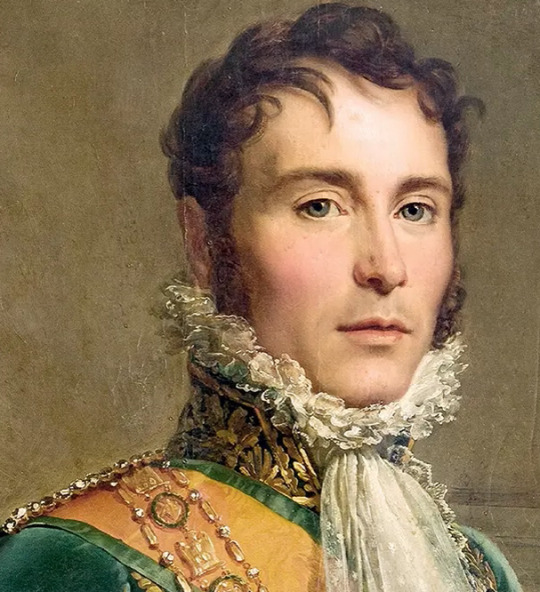
François Gérard, Portrait of Eugène de Beauharnais as viceroy (detail)
#napoleon's family#eugene de beauharnais#it's so rare to get a close-up of the finished portrait#usually it's only the sketch#the portrait itself seems to be in Stockholm
462 notes
·
View notes
Text
I tried to look up with whom Caroline Bonaparte had affairs and I found this website through my research and I don't know how to feel about this because these comments are not detailed and objective enough for me EVEN THOUGH there are sources mentioned at the end. With all of this in mind, I wanted to ask you all if you know more about these points and if you can confirm to have read about these incidents:
Let's look at some points which let me be confused, shall we?
1. Did Lannes and Caroline ever have a relationship/situationship?
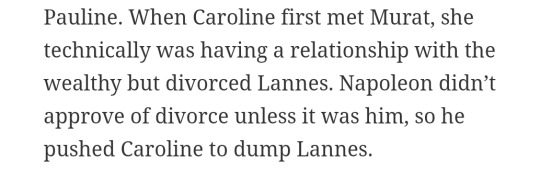
I was more confused than informed after reading these two sentences. Specifically the "unless it was him" part because I read it as if Napoleon made an exception for Lannes which he didn't? The structure of the sentence doesn't make any sense for me. At the same time, English is my third languages. Maybe I just need to read through my grammar books again and study... All of this aside, did they really have something going on?
2. Naps slapping Achille

I heard about the incident of Naps pulling at Achille's ear once but just randomely mentioning this was ???? And the thing is, this wasn't elaborated at all. When did this happen? How did this happen? How did Murat and Caroline react? I can imagine Murat getting quite protective. This incident is described as the Bonapartes disputing about something and then Napoleon slapping his nephew out of nowhere. And that's it...
3. Was Caroline really "thrilled" about the idea of staying Queen?

Pls, let me explain: I am aware of Caroline's ambitions but the verb "thrilled" sounds wrong in my eyes because, as far as I am concerned, it contains the fact that Joachim, the father of her four children, would be dead. She sounds like as if Murat didn't mean anything to her and... that wasn't the case, was it? I am open for corrections. I really want to learn.
4. This... just isn't true.

If I remember corectly, Murat's and Napoleon's relationship wasn't the best already (before Russia) because Murat wanted to reign in Naples and not to be a puppet of Napoleon.
Caroline and Murat themselves went through big highs and very big lows in 1810... i. e., Caroline went through a miscarriage.
5. Murat's indecisiveness considering leaving Napoleon's side after everything..

Gahwd, whoever wrote this, your choice of words is terrible. He wasn't an idiot. He was humane. . _.
6. Did all of the siblings really blame Caroline for everything that happened to Naps? As if they weren't done with his bullshit too... you can't tell me that Joseph wasn't just done after the peninsular war.

Why on earth would Napoleon blame Caroline for Russia? She wasn't there? In addition to that, Naps was a realist who liked to take risks and had ambitions. He is not delusional... 😭🤡
In conclusion: I am confusion.
#I am confusion#napoleon bonaparte#napoleon's marshals#joachim murat#napoleonic era#caroline murat#napoleon's family#jean lannes#Achille Murat
66 notes
·
View notes
Text
Happy birthday to Eugene de Beauharnais! September 3, 1781
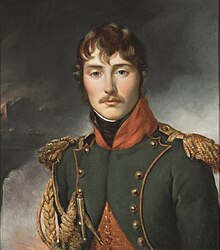
23 notes
·
View notes
Text
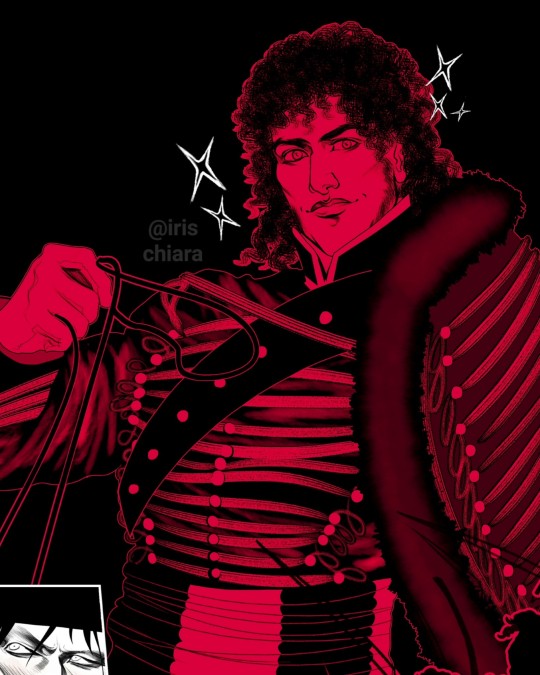
Murat in all his gorgeousness and better quality (and Napoleon's embarassed eyeroll as well)
#napoleon bonaparte#french revolution#joachim murat#caroline murat#murat#napoleon's family#frev#marshalate#13 vendemiaire#thermidor#directoire#cannons#cannonballs#junot's gonna get jealous
90 notes
·
View notes
Text
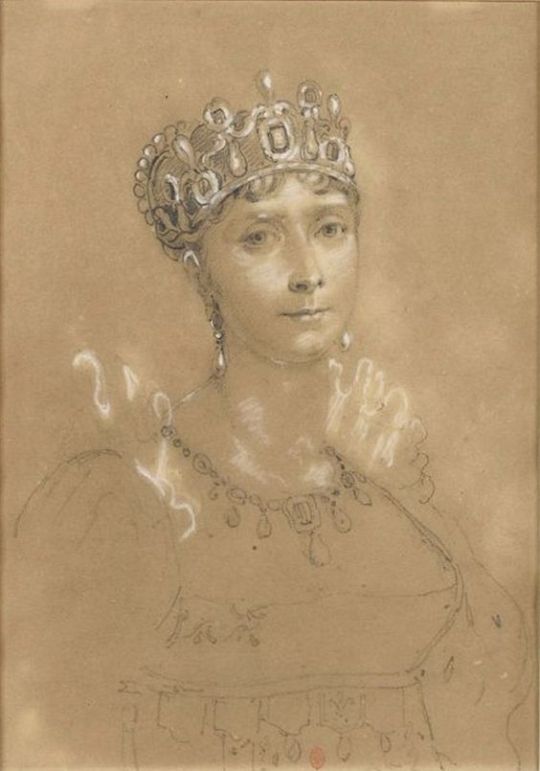
Josephine by Francois Gerard (pinterest)
14 notes
·
View notes
Photo
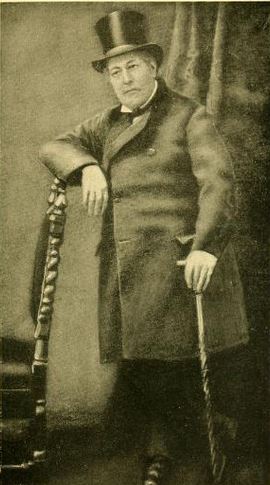
Charles Léon Denuelle in his later years
Napoleon’s first-born child, Léon Denuelle, died at Pontoise, northwest of Paris, on April 14, 1881, age 74, of stomach or bowel cancer. He was buried in a pauper’s grave in the local cemetery, marked with a black wooden cross. His remains were later dug up to make room for others. He has living descendants.
For details of Léon’s life, see “Napoleon’s Illegitimate Children: Léon Denuelle & Alexandre Walewski.”
29 notes
·
View notes
Text
My relations with the Duke of Reichstadt (2/?)
Hi guys! Here is the second part for this series! Thanks for anyone who supported the first post! Making content about the King of Rome/Napoleon II always makes me happy and fills my heart with joy. I hope you enjoy it!
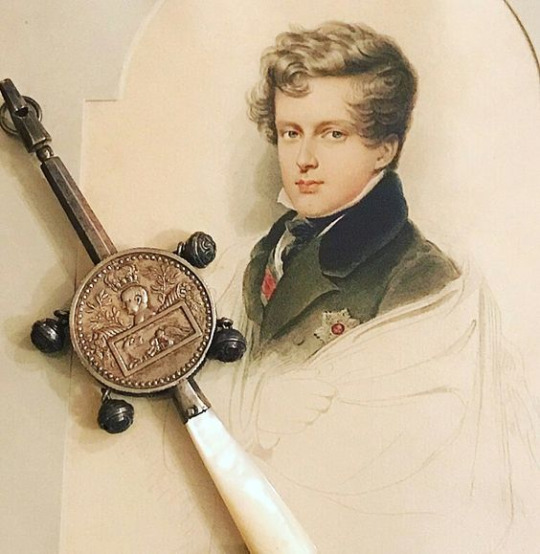
The next day, that is to say, June 24, I addressed the following lines to Count Dietrichstein: "I have been pleasantly impressed by the spirit, knowledge and judgment that your august pupil displayed in yesterday's interview; therefore I deeply regret to have neglected in the past the opportunity of an interview that honored and delighted me as much as yesterday's. When we bear such a great name and know from childhood that we are called to such high destinies; when, moreover, we are so well gifted like Your Highness and we live in times similar to our own, it is because Providence has appointed us for great things. Ordinary men, regardless of the rank in which they have been placed by birth, aspire and achieve only ordinary things. But men out of line, and among these I dare to count the eminent student of Your Excellency, they have duties towards society and history, from which they are not allowed to evade. I look forward to the time when I am granted to renew my visit of yesterday, and I desire nothing more ardently than to maintain His Highness in the opinion that he has formed of me and to which our interview the day before, as well as the favorable idea that he was able to conceive the content of some of my military writings, will certainly contribute. only to a small extent. Please accept with my best wishes, etc."
In response to this letter, I received a very friendly invitation for the next morning. This one came across the kindest orders of His Excellency the Emperor, who called me to met him that same morning. On my arrival, I saw so many people waiting in the antechambers that I thought I had the patience to see the duke. We talked to each other with all the grace of people who understand each other. I again expressed my wish to see him claim the throne of Greece, free to set whatever conditions he saw fit. This idea made him smile; but I clearly noticed that his desires and hopes were tending higher, moreover, he was trying to abuse of himself, pretending that he was too young by a few years to wear the Hellenic crown, and seeming to fear that we would not let him rule alone. Then, abruptly, he returned with marked interest to the duties and qualities of the commander-in-chief. His eyes sparkled, his cheeks burned.
Count Dietrichstein left us alone for a few moments, and the young prince held me tightly with both hands:
"Speak to me frankly," he exclaimed, "do I have some merit, and am I called to a great future, or is there nothing in me that is worthy of ending up like this? What do you think, what do you hope for my future? What will happen to the son of the great emperor? Will Europe support him in taking some kind of independent position? How do I balance my French duty with my Austrian duty? Yes, if France called me, not the France of anarchy, but the one that has faith in the Imperial principle, I would run to her, and if Europe tried to expel me from my father's throne, I would draw the sword against all Europe. But is there an imperial France today? I don't know! A few isolated voices, a few voices without influence, they cannot carry any weight. Such serious resolutions deserve and require more solid foundations. If my destiny is never to return to France, I seriously wish to become another Prince Eugene for Austria. I love my grandfather; I feel that I am a member of his family, and for Austria I would gladly draw my sword against the whole world, except France."
He spoke to me as one speaks to a confessor, and I received his confidences in the same way. These were projects, of course, very legitimate in themselves and that could only become dangerous in a single hypothesis, the realization of which, in truth, was not at all impossible, but seemed at least very distant. Once again he gave vent to the feelings of filial affection. He said that no one had understood his father; that it was pitiful, that it was slanderous not to give his actions any motive other than ambition; that all his life and all his conduct had been consumed by the great and salutary projects which he had conceived for the happiness of Europe; that Austria, in particular, had ignored him and his own interests; that he had played into the hands of the Russians. The duke added that he wanted nothing more than to earn his spurs by fighting them. He spoke with warmth, but also with that frank and intimate conviction of youth. Then, hearing Count Dietrichstein's voice in the next room, he abruptly changed the subject to address this question to me:
— What memory do you have of my father in Egypt?
— The memory of a great figure — I answered.
— I understand, if you are talking about Ibrahim, the viceroy; but the populations? They have not yet returned from their surprise; this astonishment, however, has not been followed by any irritation, for the Arabs and the Turks, though they have the same faith, do not get along with each other, and one heavy yoke succeeded another still heavier.
— Yes, this is an explanation; but the masses see in a great man only a freak of nature, a meteor that shines for a moment and immediately disappears.
At that moment he exclaimed again:
— Oh! If only you stayed with me; but before you, opens a path full of smiling perspectives capable of tempting you.
I shook his hand and said; "We'll talk about this later."
And we separated after kissing.
Only three days after this interview, and since in the meantime I had only been able to meet the Duke under unfavorable circumstances, I had a special interview with him that lasted for more than two hours. On the morning of that day, Count Dietrichstein had come to visit me and had complained, with the bad temper of a mother, about the duke's stubbornness and his aversion to any study except military art and mathematics; there wasn't even a german spelling that he didn't want to treat his way.
The count recognized that his student had a good nature, which, however, was hardened by indocility and pride. The duke, to whom I shared, insofar as I thought useful, these reproaches, did full justice to the count, especially to his excellent heart, but in short he praised nothing else in him. He had a definite opinion of his entourage, and he spoke to me frankly and forthrightly about the Emperor and the court, with the accent of an upright heart, but also of self-assured intelligence. He loved his grandfather with a filial love; for from the day he was brought to Vienna as a child, he had found in him the tenderness of a father. He had his ittle corner to play in the Emperor's room, spent half the days by his side, ate with him when the Emperor dined alone, shared with him the pleasures of the resort, finally grew close to him, like a branch grafted onto a foreign stump. He told me all this; but he added that he had not forgotten for a moment whose day he kept and in what place his father's ashes lay. He painted the court for me in colors that were often not very favorable, revealing, being honest, only the nature, the judgment, the heart, the garb of Archduke John. It was impossible for me to dispute the accuracy of his assessments. In many people he thought precisely like me, and, inside him, he did not compromise more than I did.
Like the agitated traveler who sighs after a fountain of living water, he thirsted for information about the situation in Europe. I told him everything I knew and thought. Although in my opinion the fall of Charles X was inevitable, I was far from expecting that it would be soon; as for Louis Philippe and the younger branch, I didn't even think about it.
Rather, I believed in a period of anarchy, out of which the new government would emerge. To whom would this government fall divided? Could it be the Napoleonic party? This point was beyond my judgment. I could give the duke no other advice than to strengthen his judgment by reading the history of past times, in order to appreciate contemporary events; thus learning to distinguish reality and truth from appearances and illusions, above all, meditating on his father's story, realizing the current situation of the world, which contains in germ the near future that will be the result by virtue of the irresistible logic of things; furthermore, to affirm his person in the army and in the diplomatic spheres, to attract to him capable men of great experience, of whom I named several, finally, to enlighten himself by all possible means on the internal situation of France.
With a wave of his hand, he indicated his book collection, which contained several hundred volumes. They were historical works and memoirs, all related to the war and his father.
This precious treasure was increasing day by day, to which no obstacle was placed. I promised him that I would choose the best among these works, that I would be a very devoted friend of his and that I would complement with my reflections the observations that the general state of politics would suggest to him; finally I begged him not to confuse legitimate desires with achievable desires, but to never lose sight of them. He was so well trained by his young enthusiasm that he called me his Posa(1).
I replied to him:
— That's the language of a twenty-year-old. Is there any consistency in this will? That is what, at the moment, it is difficult for me to know.”
My defiance seemed to sadden him. He kissed me, telling me:
— You're right, I don't deserve you to see in me the son of Napoleon.
I comforted him with these words:
— Your Posa, yes, but on the condition that you do not imitate don Carlos; I will be for your whole life, and I hope, that it will be a glorious life.
He reviewed the entire series of steps to be taken so that, once his military house was established, it could be linked to his person. We had time ahead of us in this regard. He thought he would achieve his ends through his grandfather, the Emperor. I authorized him to do everything he could for this purpose. As for him, he no longer doubted success.
(1) Allusion to the tragedy of Schiller Don Carlos.
Source: Mes relations avec le duc de Reichstadt : mémoire posthume / par le comte de Prokesch-Osten,. . . ; traduit de l’allemand [par A. de Prokesch-Osten fils]. (s. f.). Gallica. https://gallica.bnf.fr/ark:/12148/bpt6k6536278r/f39.item.zoom
#duke of reichstadt#l'aiglon#napoleon ii#the king of rome#napoleon's son#napoleon's family#anton prokesch-osten#hasburg#memoirs
22 notes
·
View notes
Text
More Paris Homes of the Napoleonic Bigwigs
I’ve just examined the Planche 11 mentioned in my post “Paris Homes of the Napoleonic Bigwigs”. While there is still much to be explored in the 1808 map of Paris, I have found the following bigwigs living in this particular section of the Rive gauche: Davout, whose home was the Hotel de Monaco, and Lannes right next door; Ney and Augereau, as expected; Soult; Narbonne; and, to my surprise, Princesse Elisa, whose home I had believe was the Hotel Borghese on the Rive droite.
Here is the link to Planche 11:
https://gallica.bnf.fr/ark:/12148/btv1b55007362m/f154.item.r=La%20Topographie%20de%20Paris,%20ou%20Plan%20d%C3%A9taill%C3%A9%20de%20la%20ville%20de%20Paris%20et%20de%20ses%20faubourgs.zoom
16 notes
·
View notes
Text
how to recognise a mike flanagan show:
1. people saying 4 pages of dialogue to another person who will stare back at them, looking devastated
2. mike flanagan's wife looking unbelievably hot
3. gay activity
4. carla gugino scaring the shit out of someone
5. just the worst gore you have ever seen. only for a few seconds. but christ it will stay with you
#i am adoring the new spooky show very much thank you#the fall of the house of usher#prospero usher#frederick usher#tamerlane usher#victorine lafourcade#napoleon usher#camille l'espanaye#roderick usher#bruce greenwood? izombie reunion? beautiful women? familial doom? i am TUNED IN#tfothou#horrific acronym
11K notes
·
View notes
Text

★ 【1102】 「 アニャポレオン 」 ☆
✔ republished w/permission
⊳ ⊳ follow me on twitter
845 notes
·
View notes
Text

when your father figure hugging suspicious red french thing
based on this

#team fortress 2#tf2#tf2 engineer#tf2 spy#tf2 pyro#napoleon complex#pyro please dont kill spy 😔#please be family#and hug together
2K notes
·
View notes
Text
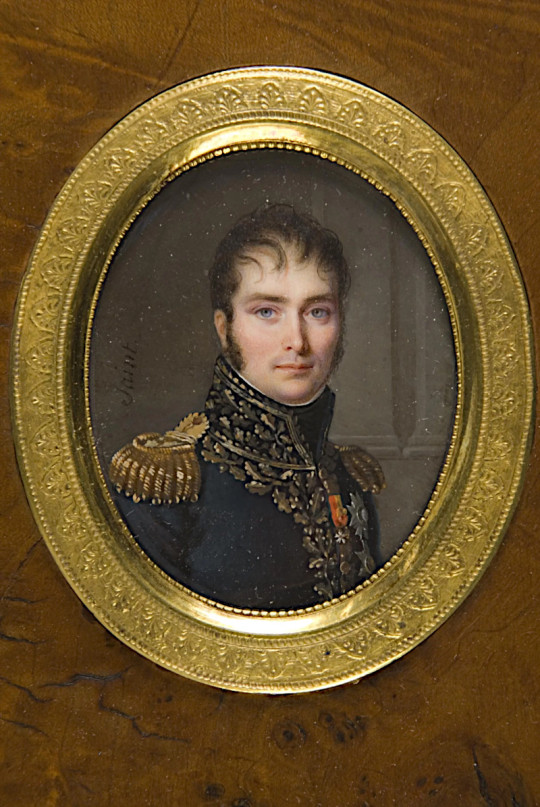
This surely has been posted before but I recently was reminded of it, so here you go again: my favourite image of Eugène de Beauharnais.
44 notes
·
View notes
Note
I love the famly can we have more plss
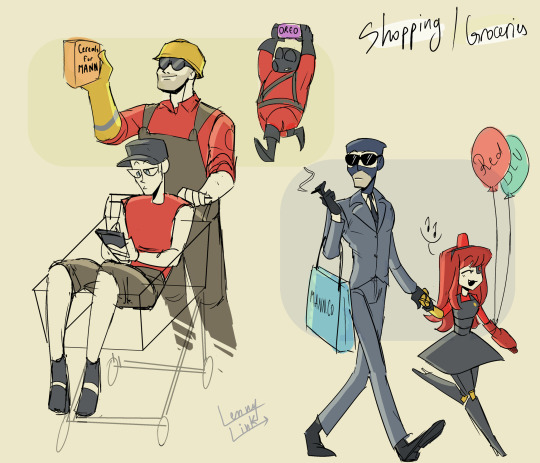
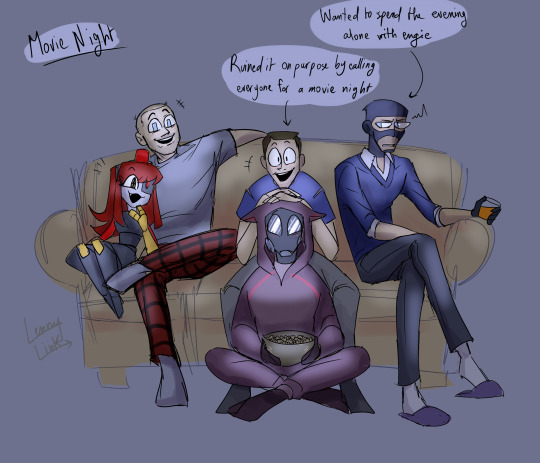


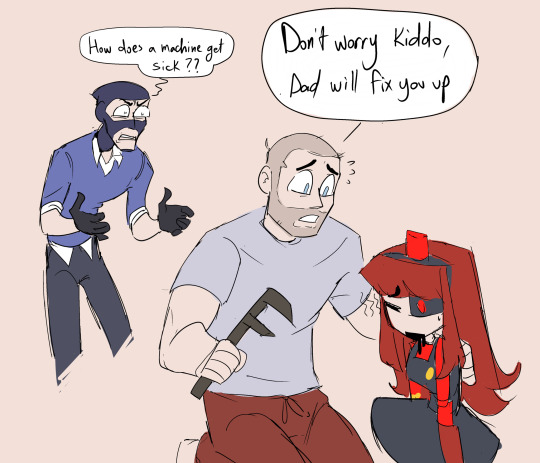
Life of the EngieSpy family lol been waiting for an excuse to finish these doodles x)
#engiespy#engiespy family#dad engineer#tf2 engineer x spy#tf2#team fortress 2#tf2 engineer#tf2 spy#tf2 scout#tf2 pyro#mimi sentry#tf2 fanart#napoleon complex#tf2 napoleon complex#practical espionage#art#fan art#my art#lol#mini comic#lennylink#ask box
657 notes
·
View notes
Text
Happy birthday Louis Bonaparte! September 2, 1778

Brother of Napoleon, father of Napoleon III
18 notes
·
View notes
Text

I thrive in this date of course
#napoleon bonaparte#josephine bonaparte#napoleon#josephine#french revolution#napoleonic era#napoleon's family#this is my comic cover#current#happy anniversary#happy marriage anniversary#ship#otp getting married 💖#otp#yess
46 notes
·
View notes
Photo

Text is from a site called The World of the Habsburgs. Hilarious--Napoleon’s reputation as an excellent lover! Never heard that one before.
At first her Austrian entourage was allowed to accompany her, but once she reached the Bavarian border her last confidantes were forced to leave her. “I assure you, dearest Papa, that I am truly unhappy and cannot console myself,” she wrote to her father after the handover in Braunau. Yet the longer the journey went on, the better Marie Louise felt. Napoleon, who was an expert at seducing young women, sent her frequent love letters and presents, and she soon began to develop sympathetic feelings towards him. Napoleon himself was waiting impatiently for his bride in Compiègne, and when, after 14 days, she and her retinue finally neared the city he spontaneously rode out to meet them. He met the column as they changed horses at a post station and without further ado joined her in her carriage. Once she had recovered from her initial shock Marie Louise was impressed by her husband’s handsome appearance. Napoleon decided to cancel the arranged ceremony of welcome and to travel immediately to Compiègne with his bride, where he – in a complete breach of normal protocol – made her his wife that very night. Napoleon’s reputation as an excellent lover was obviously deserved when it came to Marie Louise. In the first letter she wrote to her father after the early wedding she said that all the doubt that she had felt just a short time before had been replaced with euphoria: Napoleon loved her dearly and she returned his love, wrote an obviously happy young wife.
Marie-Louise by Pierre-Paul Prud'hon, 1810 (wikimedia commons)
26 notes
·
View notes